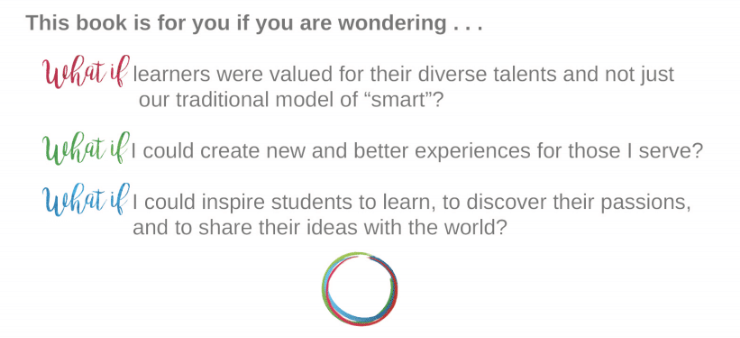It’s amazing how two very small words can make a big impact on our world and have done so throughout history.
What if I say I am not sitting at the back of the bus?
What if I create Hogwarts, a fictional land where young wizards learn and practice magic?
What if we can send people to the moon?
What if I protest with non-violent civil disobedience?
People like Claudette Colvin, Rosa Parks, J.K. Rowling, John F. Kennedy, Malala Yousafzai, and Mahatma Ghandi have changed the course of history by asking, “What if?” These ideas spurred action and more questions while inspiring others to move beyond preexisting norms and perceived barriers and challenging the status quo to seek something better. It’s worth noting that not every question changes the world, nor should it be expected to, but we also must consider what we sacrifice when we limit curiosity and ask learners to put the questions aside so that we can focus on the answers or “get through the curriculum.”
My children, Abby and Zack, are seven and eight and they ask, “What if?” all the time. They are curious about everything. They wonder about the world and their place in it. Almost every night, they work on making something, and they ask regularly to do experiments. Whether it is homemade gummy bears, various iterations of slime, a pumpkin to explode with rubber bands, or a few bowls of unidentifiable concoctions, they are always creating, mixing, or taking apart something.
My husband and I see and encourage our children’s natural curiosity, driving a constant desire and excitement to learn and discover at home, so we were surprised when we went in for my daughter’s parent-teacher conference and learned she was marked “needs improvement” in science. We looked at each other and said in unison, “I thought she loved science!” In reviewing her work, we quickly recognized that she hadn’t finished copying the sentences from the board to complete her assignment. Her teacher indicated that her “needs improvement” mark was due to a lack of following directions rather than her actual lack of achievement in science or application of the concepts they were learning. I couldn’t help but think about the stark contrast in Abby’s interest and motivation for learning when the focus was on compliance rather than creating and the wonder it inspired. I just asked her recently what she thought about science, and although she continues to love to mix and create, she insists that doesn’t like science.
Ironically, authentic learning is often at odds with the expectations placed on many teachers to cover, assess, and document achievement based on the standards and accountability systems. The necessity for evidence and a grade for the report card overrides the desire for actual growth and learning. To be clear, I’m not laying the blame for this imbalance on the teachers; we all contribute to this problem. Many parents focus on the grades; school leaders are held accountable for grades and test results, and students learn how to play the game because the larger education system is built for points, grades, and rankings.
Prioritizing Deeper Learning in Education
Some days my daughter wants to be a scientist, other days she wants to be a chef. I have no idea what she will end up doing, but I know that she loves to mix and remix and create new things — at least for now. What will we miss out on if her what if questions subside and she begins to settle for what is? What if her concoctions could someday cure cancer? What if she could open a restaurant where she could happily cook and care for people? What if she stops seeing the value of her creativity and questions and settles for a path that fails to inspire her to lead a fulfilling and successful life as she defines it? Like other children her age, she is developing her self-concept as she interacts with people and ponders her surroundings. She is learning to find her place in this world. The reality of our current system is that grades and academic achievement will increasingly play a role in how she perceives her abilities and trajectory in life. I wonder if she will continue to love learning and exploration as much as she does now if her experience in school is focused on compliance rather than developing skills and knowledge that she can use to be more creative and innovative. I’m pretty sure the answer is no.
If we really value the creation of new ideas, we must model and support inquiry and project-based learning in our schools. We can’t say we want creative thinkers and problem solvers while stifling those opportunities in school to ensure that we get through the curriculum or make sure students are prepared for a test. When we tell learners to complete an assignment, we get compliance. When we empower learners to investigate how to make an impact on the world, we inspire problem solvers and innovators.
I hope this book provides an entry point and examples to ignite conversations between administrators, teachers, students, and the greater community. If we want schools that develop successful students who are prepared for our changing world, we all need to have open and honest conversations about the vision, values, culture, and the policies that influence what happens in our districts, schools, and classrooms. As we dive into why there is a need for innovation in education, my goal is to push thinking and provide resources and examples to allow you take steps forward to meet the needs of those you serve and ultimately ask yourself, your colleagues, and your community, “What if?” and then work together to make it happen.
This is an excerpt from my new book, Learner-Centered Innovation: Spark Curiosity, Ignite Passion and unleash Genius.



0 Comments